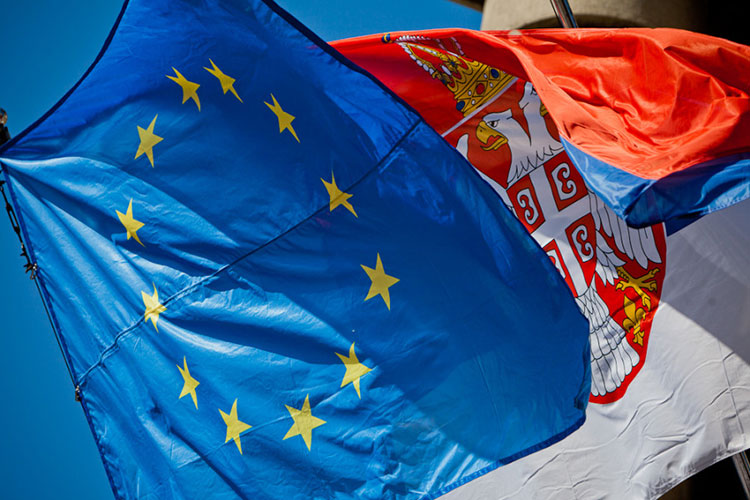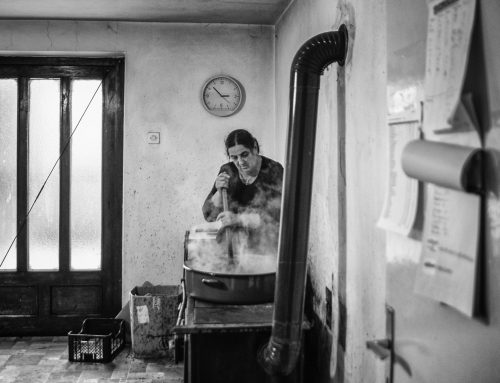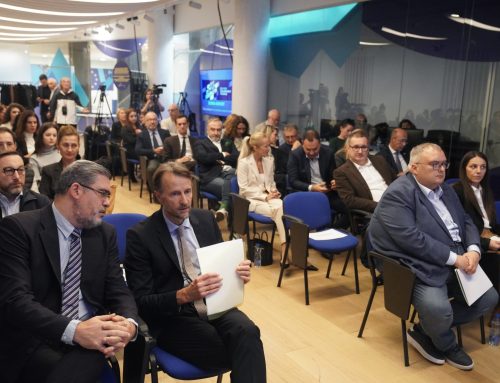Political criteria
The parliamentary, provincial and municipal elections in Serbia initially foreseen for April were postponed following the outbreak of the COVID-19 pandemic and held on 21 June 2020. While contestants were able to campaign and fundamental freedoms were respected, voter choice was limited by the governing party’s overwhelming advantage and the promotion of government policies by most major media outlets, according to the Organisation for Security and Co-operation in Europe/Office for Democratic Institutions and Human Rights (OSCE/ODIHR). Numerous recommendations previously made by ODIHR remain unaddressed. It is crucial that the Serbian authorities address long-standing electoral shortcomings through a transparent and inclusive dialogue with political parties and other relevant stakeholders well ahead of the next elections. A number of opposition parties boycotted the elections.
The newly constituted Serbian parliament is marked by the overwhelming majority of the ruling coalition and the absence of a viable opposition, a situation which is not conducive to political pluralism in the country. During the previous legislature, some steps were taken to address shortcomings in the work of the parliament with the reduction of urgent procedures and previous practices of filibustering. Several opposition parties continued their boycott of parliamentary sessions. Inflammatory language against political opponents and representatives of other institutions expressing diverging political views was used during parliamentary debate. The effectiveness, independence and transparency of the parliament, including the role and prerogatives of the parliamentary opposition, need to be strengthened to ensure the necessary checks and balances indispensable in a democratic parliament. The new parliament and political forces should continue to engage in the inter-party dialogue led by the European Parliament, with a view to improving parliamentary standards and forging broad cross-party and societal consensus on EU-related reforms, which is vital for the country’s progress on its EU path.
Serbia is moderately prepared in the area of public administration reform. No progress was made overall as the excessive number of acting senior manager positions was not sizeably reduced. Lack of transparency and respect of the merit-based recruitment procedure for senior civil service positions is an issue of increasingly serious concern. The effective implementation of the law on the planning system needs to be ensured through a strong quality control of the Public Policy Secretariat.
Serbia’s judicial system has some level of preparation. No progress was made over the reporting period. The constitutional reform on the judiciary was put on hold until after the 2020 parliamentary elections. This delay has repercussions on the adoption of related judicial legislation that is needed to increase safeguards for judicial independence. The scope for continued political influence over the judiciary under the current legislation is a serious concern. Serbia continued its efforts to reduce old enforcement cases and harmonise court practice.
Serbia has some level of preparation in the fight against corruption. Limited progress was made over the reporting period. Operational steps have been taken to strengthen the mandate and to ensure the independence of the Anti-Corruption Agency, as well as to enhance its capacities with a view to implementing the law on the prevention of corruption upon its entry into force in September 2020. The changes brought by the law on the organisation and jurisdiction of government authorities in suppression of organised crime, terrorism and corruption, in force since March 2018, produced some results in terms of finalised cases. Overall, corruption remains an issue of concern. There is still no effective prevention coordination mechanism in place. The number of finalised high-level corruption cases has decreased compared with the previous years. Serbia needs to increase its efforts and step up the prevention and repression of corruption.
In the fight against organised crime, Serbia has some level of preparation with limited progress over the reporting period related notably to structural reforms and interagency cooperation. Serbia is stepping up its cooperation with Europol. Overall, Serbia has yet to establish a convincing track record of effective investigations, prosecutions and final convictions in serious and organised crime cases, leading to an increased amount of confiscated assets. Serbia needs to increase its efforts in dismantling large and internationally active criminal organisations.
The legislative and institutional framework for upholding fundamental rights is broadly in place. However, its consistent and efficient implementation still needs to be ensured. Human rights institutions need to be strengthened and their independence guaranteed, including via the allocation of the necessary financial and human resources. Serbia has adopted a new media strategy, which was drafted in a transparent and inclusive manner and identifies the main challenges related to media freedom in Serbia. However, implementation of the new strategy has not yet started and no progress was made yet on the ground to improve the overall environment for freedom of expression. As identified in the media strategy, cases of threats, intimidation and violence against journalists are still a source of serious concern. Transparency of media ownership and of allocation of public funds, especially at local level, has yet to be established. ODIHR found that most TV channels with national coverage and newspapers promoted government policy during the electoral campaign. It also found that the few media outlets which offered alternative views had limited outreach and provided no effective counterbalance, which compromised the diversity of political views available through traditional media, through which most voters receive information.
Serbia continued to significantly contribute to the management of the mixed migration flows towards the EU by playing an active and constructive role and cooperating effectively with its neighbours and EU Member States. It also continued to effectively implement the integrated border management strategy and its action plan.
On the economic criteria, Serbia made some progress and is moderately prepared/at a good level of preparation in developing a functioning market economy. Prior to the COVID-19 crisis, the pace of GDP growth picked up as domestic demand strengthened. External imbalances widened but their financing remained healthy due to high inflows of foreign direct investment. Price pressures remained subdued and inflation expectations contained. By reducing the budgetary deficit and maintaining a prudent fiscal stance, Serbia has significantly improved debt sustainability. Labour market performance has improved, with the lowest unemployment rates in the last decade; however, this was also due to large-scale emigration. The COVID-19 crisis is however projected to strongly deteriorate the economic outlook in 2020, in particular as regards GDP growth, public finances and employment. While some progress has been made in the reforms of the tax administration and the privatisation of state-owned banks, other structural reforms of public administration and state owned enterprises advanced slowly. Weaknesses in the budgetary framework need to be addressed. There has been no progress in strengthening the fiscal rules. The state retains a strong footprint in the economy and the private sector is hampered by weaknesses in the rule of law.
Serbia made some progress and is moderately prepared to cope with competitive pressure and market forces within the EU. The structure of the economy improved further and economic integration with the EU remained high. However, despite some progress, the quality and relevance of education and training does not fully meet labour market needs. Investment has continued to increase but, after years of underinvestment, remains insufficient to address serious infrastructure needs. Serbia needs to apply the same rules for prioritising, selecting and monitoring all capital investments regardless of the type of investment or the source of financing, including those under intergovernmental agreements. All investment decisions need to follow EU standards on public procurement, state aid, environmental impact assessments and cost-benefit analysis. Although the cost of borrowing for small and medium-sized enterprises has declined recently, they still face a number of challenges, including a volatile business environment and unfair competition.
Serbia overall remained committed to bilateral relations with other enlargement countries and neighbouring EU Member States and an active participant in regional cooperation. Relations with Montenegro have been marked by tensions, including concerning the 30 August parliamentary elections in Montenegro. Serbia demonstrated its commitments to provide a renewed impetus to regional cooperation and enhanced regional ownership at the summits in Novi Sad, Ohrid and Tirana. It is important that regional initiatives include all partners in the Western Balkans and are based on EU rules, building on commitments previously taken in the framework of CEFTA, the Regional Economic Area (REA) or the Transport Community Treaty.
Regarding the normalisation of relations with Kosovo*, the EU-facilitated dialogue resumed with high-level meetings on 12 and 16 July, and 7 September 2020. A number of expert level meetings took place in Brussels. Serbia needs to make further substantial efforts and contribute to reaching a comprehensive legally binding agreement with Kosovo. Such an agreement is urgent and crucial so that Kosovo and Serbia can advance on their respective European paths.
As regards its ability to assume the obligations of membership, Serbia stepped up its work to align legislation with the EU acquis in the economic and internal market chapters. The country made good progress in economic areas such as company law, intellectual property law, competition and financial services. However, limited progress was made on public procurement. Even though Serbia aligned significant parts of its public procurement legislation with the acquis, a law on special procedures for linear infrastructure projects, adopted in February 2020, allows exemption of infrastructure projects of “special importance” for Serbia from the application of public procurement rules and, thus, allows for the circumvention of EU rules and standards. Especially the implementation of intergovernmental agreements concluded with third countries do not seem to be systematically in line with the principles of equal treatment, non-discrimination, transparency and competition and neither fully consistent with the relevant EU acquis and national legislation. Environment and climate change need to receive adequate political attention, translating into better coordination, stronger institutions, more financing and mainstreaming across all sectors of the economy. Advancing on a green energy transition, away from coal, needs to become a priority, and a part of Serbia redoubling its efforts to fight air pollution. Regarding transport, Serbia continued with rail reforms. Transport investment decisions need to ensure best value for money. Adequate financial and human resources and sound strategic frameworks will be crucial for the pace of reforms, including in particular the appointment of a head of Serbia’s EU negotiating team.
Serbia continued to develop intense relations and strategic partnerships with a number of countries worldwide, including Russia, China and the US. Cooperation with China increased during the COVID-19 crisis and was marked by pro-China and EU sceptical rhetoric by high-ranking state officials. Frequent high-level contacts and regular bilateral visits with Russia were maintained as well as military technical cooperation, including joint military drills and arms trade arrangements. The President of Serbia pledged to move the Serbian embassy in Israel to Jerusalem by July 2021. Serbia aligned with 60% of the EU CFSP positions in 2019 and needs to step up its efforts in order to progressively align its foreign and security policy with that of the European Union in the period up to accession.
Key dates
June 2003: The EU-Western Balkans Thessaloniki Summit confirms the EU perspective for the Western Balkans.
April 2008: The EU-Serbia Stabilisation and Association Agreement is signed.
December 2009: Visa-free travel to Schengen area for citizens of Serbia; Serbia presents its application for membership of the EU.
March 2011: The EU-facilitated dialogue for the normalisation of relations between Belgrade and Pristina is launched.
October 2011: The European Commission issues its Opinion on Serbia’s application for EU membership.
March 2012: The European Council grants candidate status to Serbia.
April 2013: The European Commission recommends the opening of accession negotiations with Serbia.
September 2013: The Stabilisation and Association Agreement enters into force; the analytical examination of the acquis (“screening”) starts.
December 2013: The Council adopts the negotiating framework.
21 January 2014: The accession negotiations are formally opened at the first inter-governmental conference.
December 2015: Chapter 35 dealing with normalisation of relations between Serbia and Kosovo, is opened.
July 2016: ‘Rule of Law’ chapters 23 and 24 are opened.
February 2018: The European Commission adopts its strategy for ‘A credible enlargement perspective for and enhanced EU engagement with the Western Balkans’.
May 2018: The EU-Western Balkans Sofia Summit confirms the European perspective of the region and sets out a number of concrete actions to strengthen cooperation in the areas of connectivity, security and the rule of law.
February 2020: Revised methodology, presented by the Commission, to drive forward the enlargement process with a stronger political steer and in a more credible, predictable, dynamic way.
May 2020: EU-Western Balkans Zagreb Summit.
October 2020: Commission proposes Economic & Investment Plan to support and bring the Western Balkans closer to the EU.
As of October 2020, 18 out of 35 chapters have been opened, two of which are provisionally closed.
For More Information
*This designation is without prejudice to positions on status, and is in line with UNSCR 1244/1999 and the ICJ Opinion on the Kosovo declaration of independence.




